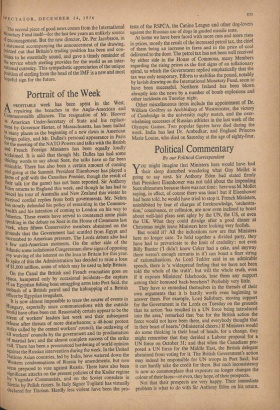Portrait of the Week
A PROFITABLE week has been spent in the West, repairing the breaches in the Anglo-American and Commonwealth alliances. The resignation of Mr. Hoover as American Under-Secretary of State and his replace- ment by Governor Herter, of Massachusetts, has been hailed many places as the beginning of a new dawn in American foreign policy, and Mr. Dulles's personal appearance in Paris for the meeting of the NATO Powers and talks with the British and French Foreign Ministers has been equally loudly acclaimed. It is said that though Mr. Dulles has had some Chiding words to say about Suez, the talks have so far been amicable. There has also been a certain amount of coming and going at the Summit. President Eisenhower has played a game of golf with the Canadian Premier, though the result of their talk (or the game) has not been reported. Sir Anthony Eden returns to England this week, and though he has had to cancel his tour of Australia and New Zealand this winter he received cordial replies from both governments. Mr. Nehru has stoutly defended his policy of remaining in the Common- wealth and his intention of coming to London on his way to America. These events have served to counteract some plain sPeaking in the debate on Suez in the House of Commons last Week, when fifteen Conservative members abstained on the grounds that the Government had scuttled from .Egypt and Succumbed to American pressure. The Lords debate also had a few anti-American moments. On the other side of the Atlantic some isolationist Congressmen show signs of opposing Ian waiving of the interest on the loan to Britain for this year. in spite of this the Administration has decided to raise a loan of $1,000 million, some of which may be used to help Britain.
On the Canal the British and French evacuation goes on apace, hampered only by occasional incidents—the capture of an Egyptian fishing boat smuggling arms into Port Said, the ambush of a British patrol and the kidnapping of a British officer by Egyptian irregulars. It is now almost impossible to trace the course of events in Hungary, especially since communications with the outside World have often been cut. Reasonably certain appear to be the arrest of workers' leaders last week and their subsequent release after threats of more disturbances; a 48-hour protest strike called by the central workers' council; the outlawing of ail workers' councils by the government and its proclamation Of martial law; and the almost complete success of the strike Call. There has been a pronounced hardening of world opinion against the Russian intervention during the week. In the United Nations Asian countries, led by India, have watered down the Western condemnations of Russia by amendments, but now seem prepared to vote against Russia. There have also been significant attacks on the present policies of the Kadar regime by Yugoslav Communists, and on the Soviet consulate in Stettin by Polish rioters. In Italy Signor Togliatti has virtually declared for Titoism. Hardly less violent have been the pro- tests of the RSPCA, the Canine League and other dog-lovers against the Russian use of dogs in guided missile tests.
At home we have been faced with more cuts and more rises in prices, mostly the result of the increased petrol tax, the chief of them being an increase in fares and in the price of coal delivered to the door. The petrol tax has not been well received by either side in the House of Commons, many Members regarding the rising prices as the first signs of an inflationary spiral, to which the Government replied emphatically that the tax was only temporary. Efforts to stabilise the pound, notably by lavish drawing on the International Monetary Fund, seem to have been successful. Northern Ireland has been blown abruptly into the news by a number of bomb explosions and other incidents on Tuesday night.
Other miscellaneous items include the appointment of Dr. William Godfrey as Archbishop of Westminster, the victory of Cambridge in the university rugby match, and the over- whelming successes of Russian athletes in the last week of the Olympic Games. Two popular figures have died during the week. India has lost Dr. Ambedkar, and England Princess Marie Louise, who died on Saturday at the age of eighty-four.










































 Previous page
Previous page